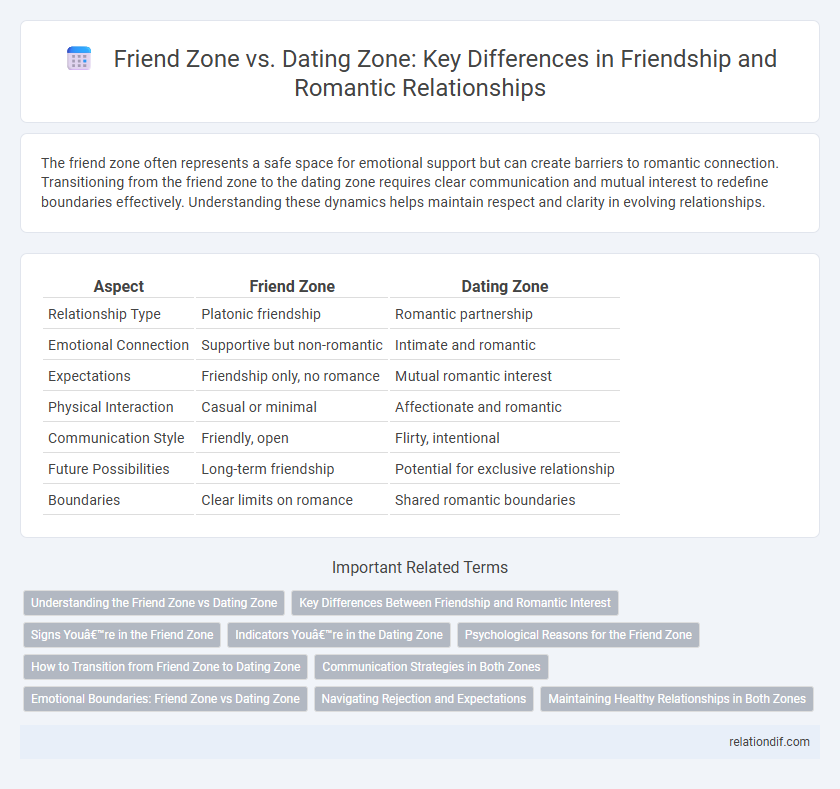The friend zone often represents a safe space for emotional support but can create barriers to romantic connection. Transitioning from the friend zone to the dating zone requires clear communication and mutual interest to redefine boundaries effectively. Understanding these dynamics helps maintain respect and clarity in evolving relationships.
Table of Comparison
| Aspect | Friend Zone | Dating Zone |
|---|---|---|
| Relationship Type | Platonic friendship | Romantic partnership |
| Emotional Connection | Supportive but non-romantic | Intimate and romantic |
| Expectations | Friendship only, no romance | Mutual romantic interest |
| Physical Interaction | Casual or minimal | Affectionate and romantic |
| Communication Style | Friendly, open | Flirty, intentional |
| Future Possibilities | Long-term friendship | Potential for exclusive relationship |
| Boundaries | Clear limits on romance | Shared romantic boundaries |
Understanding the Friend Zone vs Dating Zone
Understanding the friend zone involves recognizing a platonic boundary where one person views the relationship without romantic interest, contrasting with the dating zone that is defined by mutual attraction and emotional intimacy. Key factors include communication styles, expressed intentions, and the presence or absence of romantic signals, which differentiate friendship from dating potential. Identifying these zones can prevent misinterpretations and help manage expectations in interpersonal relationships.
Key Differences Between Friendship and Romantic Interest
Friendship centers on mutual trust, shared interests, and emotional support without romantic expectations, fostering a bond based on understanding and companionship. Romantic interest introduces physical attraction, desire for exclusivity, and an intention to build a life together, distinguishing it from platonic connections. Recognizing body language and communication patterns helps differentiate between the friend zone and dating zone dynamics.
Signs You’re in the Friend Zone
Signs you're in the friend zone include one-sided emotional investment, frequent platonic interactions such as casual texting or group hangouts, and a lack of romantic or physical cues like flirting or intimate conversations. When your feelings are not reciprocated, the other person may openly discuss their dating interests with you or introduce you as a friend to others. Consistent avoidance of alone time or romantic intentions further indicates being placed firmly in the friend zone rather than progressing to the dating zone.
Indicators You’re in the Dating Zone
Indicators you're in the dating zone include frequent one-on-one communication, physical touch that feels natural and affectionate, and exclusive plans that focus on deepening emotional connection. When your interactions shift from casual group hangouts to intentional time spent together, it signals growing romantic interest beyond the friend zone. Verbal cues expressing admiration or subtle flirting often accompany these behaviors, distinguishing dating zone dynamics from purely platonic friendship.
Psychological Reasons for the Friend Zone
Psychological reasons for the friend zone often stem from fear of rejection and the desire to maintain emotional safety, leading individuals to categorize others as purely platonic. Attachment styles, such as anxious or avoidant, influence how people navigate intimate connections, potentially causing hesitation to transition from friendship to romance. Social conditioning and past experiences also contribute to placing someone in the friend zone, where emotional closeness is valued without risking vulnerability associated with dating.
How to Transition from Friend Zone to Dating Zone
Transitioning from the friend zone to the dating zone requires clear communication of romantic interest and subtle changes in behavior to signal attraction, such as increased eye contact and physical closeness. Building emotional intimacy through deeper conversations and shared experiences strengthens the connection, making the shift more natural. Confidence and respect for boundaries are crucial to navigate this transition without damaging the existing friendship.
Communication Strategies in Both Zones
Effective communication strategies differ significantly between the friend zone and the dating zone, emphasizing clarity and emotional expression. In the friend zone, active listening and maintaining boundaries foster mutual respect and trust without romantic expectations. In the dating zone, open dialogue about feelings, intentions, and expectations creates deeper connection and helps navigate potential relationship progression.
Emotional Boundaries: Friend Zone vs Dating Zone
Emotional boundaries in the friend zone often emphasize mutual support, trust, and non-romantic affection, creating a safe space without expectations of intimacy or exclusivity. In the dating zone, emotional boundaries shift toward vulnerability, romantic connection, and exclusive emotional investment, fostering deeper intimacy and shared future goals. Clear communication about these boundaries helps prevent misunderstandings and maintain respect in both types of relationships.
Navigating Rejection and Expectations
Navigating rejection in the friend zone requires clear communication and emotional resilience to manage unreciprocated romantic feelings while preserving the friendship. Understanding expectations in the dating zone involves mutual interest, consent, and acknowledgment of both partners' intentions to avoid confusion and emotional distress. Establishing boundaries and openly discussing feelings contribute to healthier interactions and prevent misinterpretations between friendship and romantic relationships.
Maintaining Healthy Relationships in Both Zones
Maintaining healthy relationships in both the friend zone and dating zone requires clear communication, respect for boundaries, and mutual understanding of each other's feelings. Establishing expectations early helps prevent misunderstandings and fosters trust, whether the relationship remains platonic or becomes romantic. Prioritizing empathy and emotional support ensures both parties feel valued and secure, promoting long-term connection regardless of the relationship type.
friend zone vs dating zone Infographic

 relationdif.com
relationdif.com